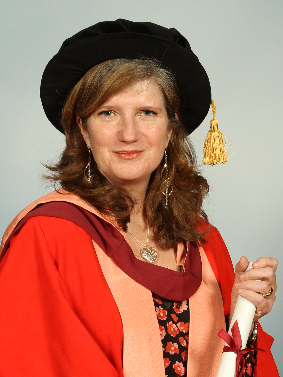Fiona Fox OBE, FMedSci
Doctor of Science
Wednesday 20 February 2019 - Orator: Professor Adam Finn
Vice Chancellor,
Since 2015 just about everyone has woken up to the very real dangers of disinformation – of ‘fake news’. Our anxieties tend to focus on peer-to-peer social media platforms – but they are relevant to more established, top-down media outlets too, both published (now increasingly online) and broadcast. The damage that misleading people en masse can do to our political, social and public health systems is now obvious to us all. But some people woke up to the importance of improving the quality and accuracy of information reaching the public a long time ago – and one of them was Fiona Fox.
The Science Media Centre came into being following a report on ‘Science and Society’ from the United Kingdom House of Lords Select Committee on Science and Technology, published in 2000. Fiona was appointed its first director in 2002. The principle that drove the creation of the SMC was the need for more open, accessible and understandable communication between scientists and journalists and thus more accurate and relevant information reaching the public. To put it another way, the SMC aims to challenge the idea that the default response of the academic, when told they are speaking to a journalist on the phone, should be to hang up!
What Fiona brought to the SMC was a background not in science, but in journalism. That was the subject of her degree. Her prior experience included working as Media Relations Officer for a London-based charity providing reproductive health advice to young people, as Senior Press Officer at the Equal Opportunities Commission, and running media operations at the National Council for One Parent Families. She went on to become Head of Media at the Catholic Agency For Overseas Development, or CAFOD – one of the UK’s leading aid agencies – and subsequently founded the Jubilee 2000 press group which aimed to force serious international development issues onto media and political agendas.
Under Fiona’s directorship, the SMC has become much more than a vehicle for co-ordinating responses to ‘science stories’. Her founding philosophy was and is that ‘the media will do science better when scientists do the media better.’ This is an organisation that works with and exists for scientists as much as it does for journalists. It is firmly established as the ‘place to go’ for the latter when they want a well-informed opinion about a scientific topic or development – whether to run with it and, if so, what it means and whether and why it matters. The SMC has a well-established network of experts it can call on at a moment’s notice to provide such advice. But it does a lot more than that. It encourages scientists to improve their communication skills and helps them do so. It picks up on emerging issues and topics and showcases them. Just as it has a network of scientific experts to call on, including a number here in Bristol, it is linked up to a network of expert journalists in two-way mode, responding to their requests and alerting them to important and newsworthy developments in science. As Fiona puts it: ‘We are not just getting more scientists into the media…we are ensuring the media has access to the very best scientists and the highest quality evidence.’ A testament to the success of the model is that several other countries are now scrambling to replicate it.
I know Fiona and the SMC team because of vaccines, which are my thing. Most, if not all, of those present will be aware of the protracted dog’s breakfast that was made out of some extremely poor science concerning the entirely excellent combination vaccine against measles, mumps and rubella, usually called MMR. We are still paying the price for that mess even now, with outbreaks of measles in this country and throughout Europe, and very serious concerns about the possible re-emergence of congenital rubella syndrome. Awareness of the mass of misinformation that was created then has made most of today’s journalists a lot more careful when it comes to vaccine scare stories, and the SMC has made it a lot easier for them to get things right by providing rapid access to well-informed experts as and when needed.
The University of Bristol is not alone in honouring Fiona’s achievements. She was awarded an OBE for services to science in 2013 and last year became an honorary fellow of the Academy of Medical Sciences.
Since she will not be addressing you today I would like to conclude with two quotes from her acceptance address for the latter. As you will hear, she has some important lessons for us in academia:
‘Do not be complacent about the gains we have made. While President Trump, the Pope and Theresa May felt qualified to enter the debate on Charlie Gard, the researchers and clinicians who treat similar children were told not to speak to journalists by their NHS Trusts.’
And:
‘The latest trust polls show yet again that over 80% of the public trust professors, doctors and scientists; trust levels that journalists and politicians would die for. You have earned this trust, you deserve it - but you need to use your trusted voice to good effect. Correcting bad science and fighting for the evidence may well fan the flames of a row, and it might not be the best thing for your institution’s brand. But in these days of fake news and post-truth, we need you more than ever.’
Vice-Chancellor, I present to you Fiona Bernadette Fox, as eminently worthy of the degree of Doctor of Science,
honoris causa.

